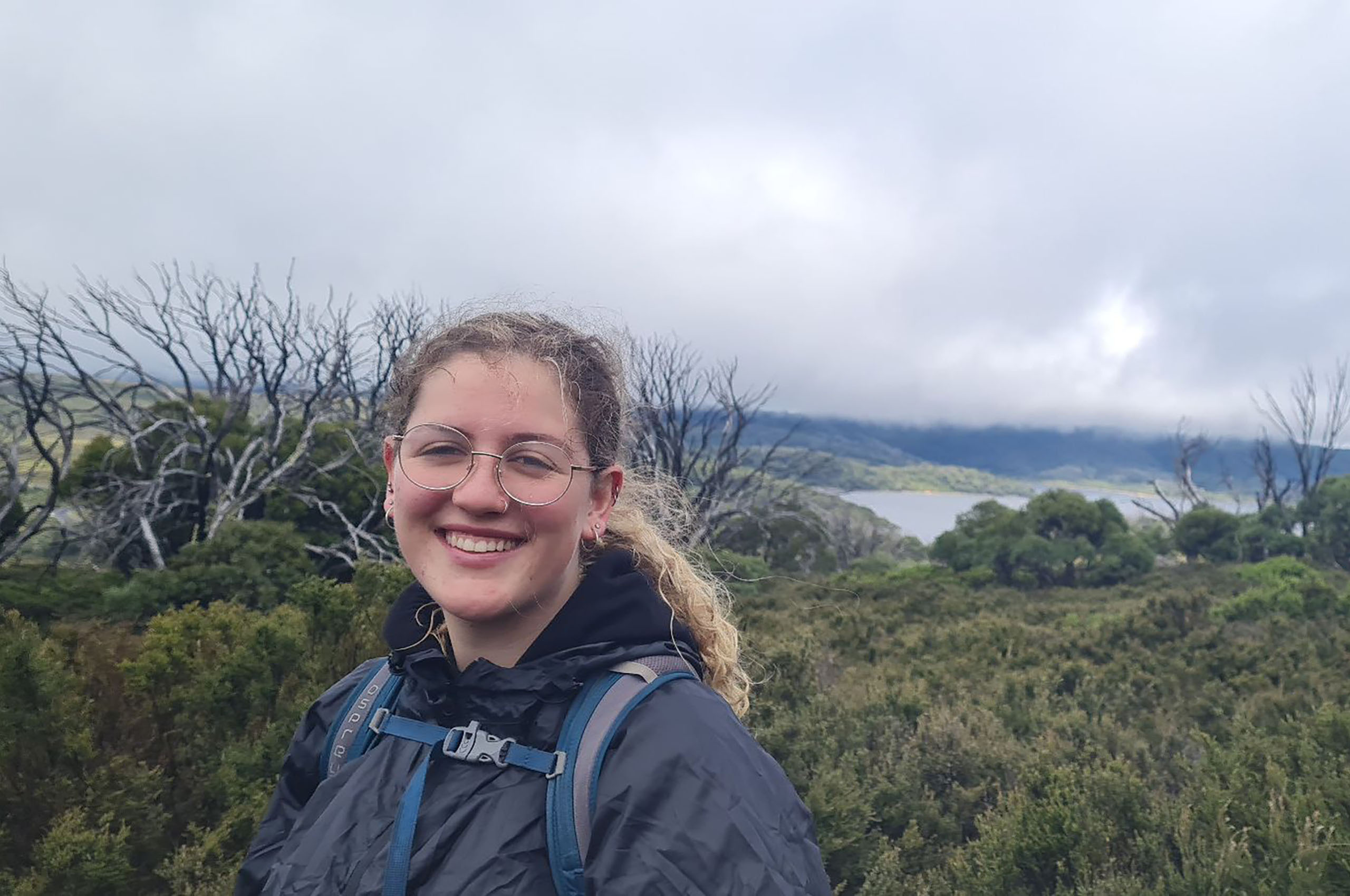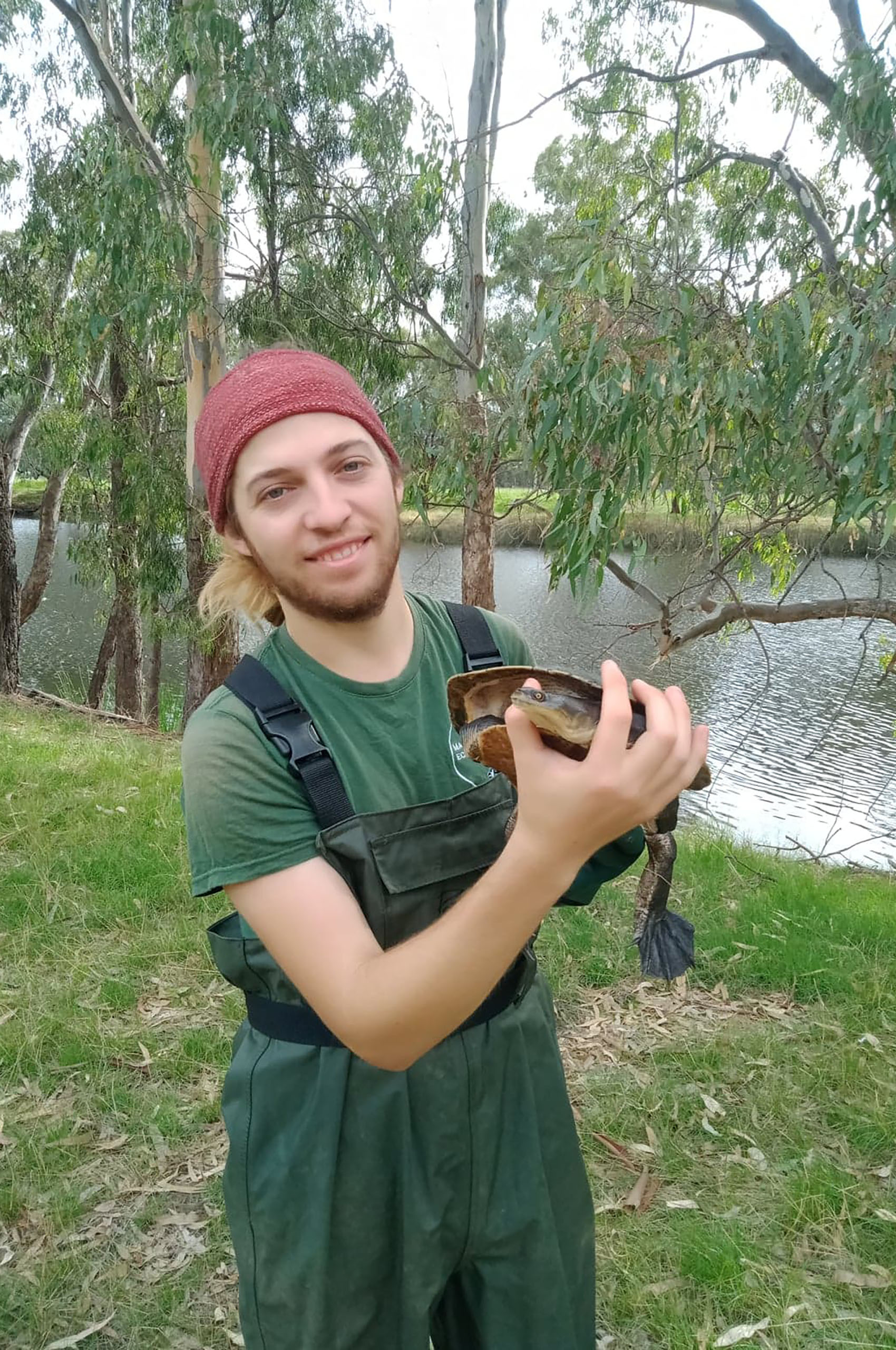Cadetships
All La Trobe University science undergraduate students (completing second or third year) can apply for a cadetship. Cadetships can range between 1 to 12 weeks and may occur anytime during the year.
Students will undertake a research project under the guidance of the Centres scientific research staff. The role is full time and may involve remote, multi-day field trips. Students will be paid $450 per week. Project timing and duration can be negotiated with the supervisors.
Please see available project opportunities and how to apply here.
Previous cadetship experiences
Sarah Green
 Coming from a biochemistry background, I was exposed to a different area of science where I was able to enhance my lab skills and gain new skills in the field. While the project I was working on didn’t have any field work I was able to do field work in Falls Creek, the desert near Bourke and with turtles here in Wodonga.
Coming from a biochemistry background, I was exposed to a different area of science where I was able to enhance my lab skills and gain new skills in the field. While the project I was working on didn’t have any field work I was able to do field work in Falls Creek, the desert near Bourke and with turtles here in Wodonga.
As for the lab, I was taught how to use different machines including the Flow cytometer to count my algae cells, TOC analyser to measure carbon and the Atomic Absorption Spectrometer (AAS) to measure amounts of copper. Further, I was able to go to the Synchrotron in Melbourne and spent three days running my samples and others on the infrared beamline.
I am thankful for doing this cadetship as it has opened this area of science as a possible career for me, one I didn’t think was possible as I haven’t come from an environmental science degree. I enjoyed the cadetship – the centre, the people, the work, enough that I have decided to pursue my honours here, continuing the work I started.
Ian Hawkins
 I've been really passionate about freshwater environments for many years, even before my degree, so I leapt at the opportunity to delve further. I really enjoyed the work we did on the freshwater ecosystems field trip and the mountain ecosystems field trip- it was really exciting to continue on with that work, along with the friends I had made on that trip. And to get the lab experience that I didn't get during the pandemic was really great.
I've been really passionate about freshwater environments for many years, even before my degree, so I leapt at the opportunity to delve further. I really enjoyed the work we did on the freshwater ecosystems field trip and the mountain ecosystems field trip- it was really exciting to continue on with that work, along with the friends I had made on that trip. And to get the lab experience that I didn't get during the pandemic was really great.
Most of my work was in the lab, working on a project to study the degradation of eDNA. eDNA is a molecular species detection technique, using similar PCR swabs similar to that of a Covid test. However instead of swabbing your nose to look for a virus, we can swab a river to look for a fish, or whatever other species we might be looking for. A major limitation of this technology is being able to interpret exactly what a positive or negative result means. If your river has tested positive for river blackfish- was that fish here just a minute ago, or are you detecting a fish from upstream, possibly even a month ago? Perplexingly, some water ways known to have certain species present can produce negative results in a PCR test.
We sought to watch DNA degrading in different environmental conditions, in a lab setting, to better understand how DNA degrades in our aquatic environments.
I also participated in research on the impacts of the black summer fires on the alpine peat bogs of the Bogong High Plains. We conducted vegetation assessments, burn severity assessments, and measured a range of water quality parameters to get an in depth look at what may have changed in these environments.
And finally, I got the opportunity to assist with a turtle survey in Wodonga, assisting researchers in handling live turtles.
After a couple years of locked down learning, the opportunity to do university level research, face-to-face and develop the hands-on skills of lab work was a real blessing. I also got the opportunity to explore a corner of Victoria I wouldn't normally spend so much time in- seeing many different areas of the Murray country. A highlight on my weekend explorations was snorkelling with galaxias fish and spiny crayfish at a waterfall in the alps.
Matthew Brewer
Exploration of symbiotic interactions between River Redgums and mycorrhizal fungi on
Location: Wodonga, Victoria
This project will use a combination of field assessments, soil chemistry, through to next generation DNA sequencing techniques to disentangle a subset of these questions. Field experiments will likely be conducted within the Barmah National Park.
Will Beck
Health of a floodplain Internship
Location: Mildura, Victoria
Monitoring ecological responses in floodplain ecosystems is an important aspect of understanding responses to disturbance regimes such as flooding and drying. This practical, internship style cadetship provides hands-on experience of monitoring and research projects in the lower Murray Darling region.
Bianca Berto
Biodiversity in Rare and Threatened Alpine Plant Communities on the Bogong High Plains and Threats from Invasive Deer
Location: Falls Creek , Victoria
The rise of Sambar Deer in the Australian Alps over the last decade has been remarkable. The potential for negative impacts on species, communities and ecological function is poorly documented and hence, there is some urgency to develop management approaches to reduce/minimise their impacts. This project examines current impacts of deer on threatened alpine plant communities (such as snowpatches), with a focus on EPBC-listed plant species.
Hannah Churches
 Having gained an interest in plants, geography and freshwater systems during my undergrad, I was excited to work on a project that investigated wetland communities and their hydrological requirements. I wanted to learn how to work with spatial data and look at vegetation on a macro-scale, and was lucky enough to be offered a cadetship project that catered to these!
Having gained an interest in plants, geography and freshwater systems during my undergrad, I was excited to work on a project that investigated wetland communities and their hydrological requirements. I wanted to learn how to work with spatial data and look at vegetation on a macro-scale, and was lucky enough to be offered a cadetship project that catered to these!
I learnt R to conduct my spatial analysis, and started from the basics; working with vector and raster data, learning how to wrangle, troubleshoot, search google for errors… I got familiar with the sf package which allowed me to manipulate large spatial datasets including vegetation layers, wetland maps, and satellite imagery-derived hydrological information, and produced summary plots to identify trends.
Even though my project was desk-based, I got to participate in fieldwork opportunities that came my way! I undertook turtle trapping and measuring along the Edward-Kolety River; learnt water-, biofilm-, and eDNA-sampling in the Gwydir Wetlands; and further practiced these sampling skills in alpine streams around Falls Creek.
What I really appreciate from this cadetship is that it gave me an avenue to learn R – an important and widely-used tool – in a supported, immersive, and meaningful way. Having very little math/statistical skills from before, it feels great to know that in a limited timeframe I can learn the program from scratch well enough to apply it to spatial analysis of environmental data.
The cadetship also introduced me to the world of science more broadly, which I really appreciated having come from an arts background; I got to attend seminars, network, and learn about future research and careers in general.
Finally, I loved how many new places I got to experience – either through my fieldwork, or from exploring in my own time around Wodonga and weekend trips to the mountains.
